Run-Off Early Voting: May 14-18
Election Day: May 22
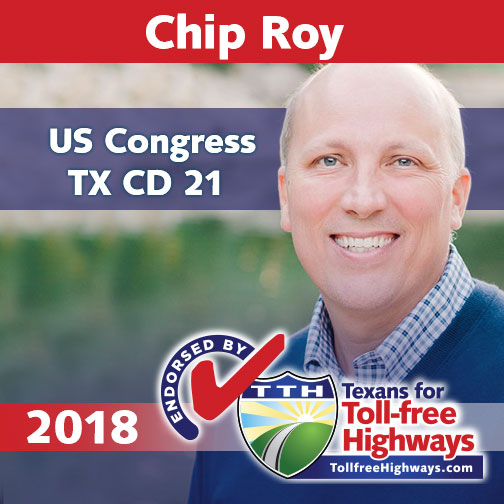
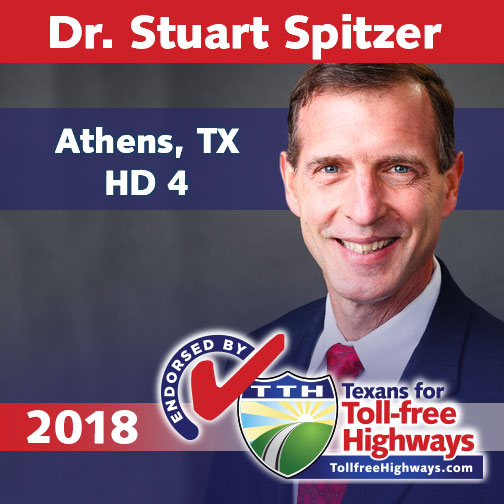
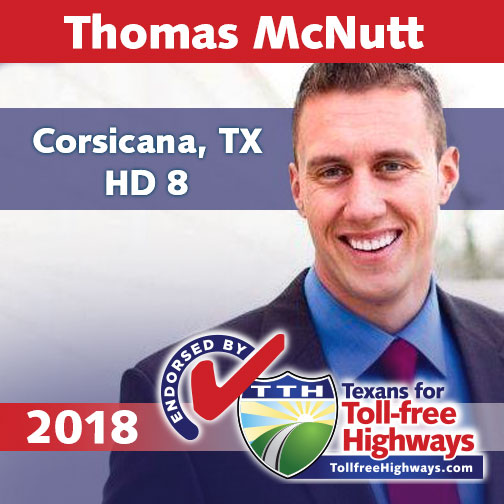

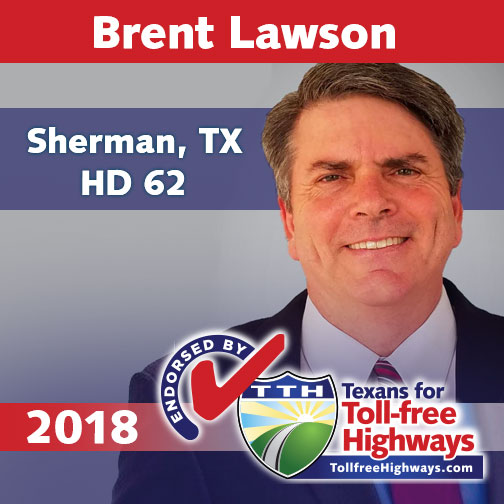
The way we get progress is to have enough lawmakers committed to protecting taxpayers from punitive toll taxes to get our reforms across the finish line.
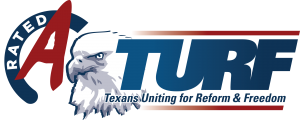
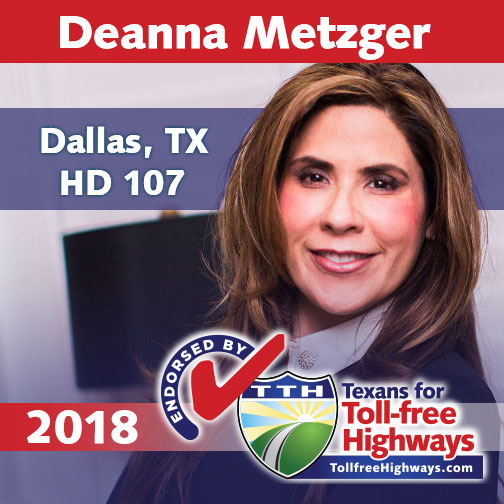
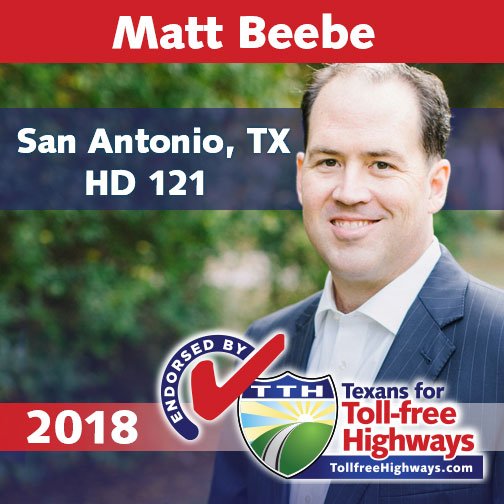

Texans working toward reforms through accountability and good public policy as well as promoting non-toll, affordable, and sensible transportation solutions.

News from media sources related to transportation and mobility issues.










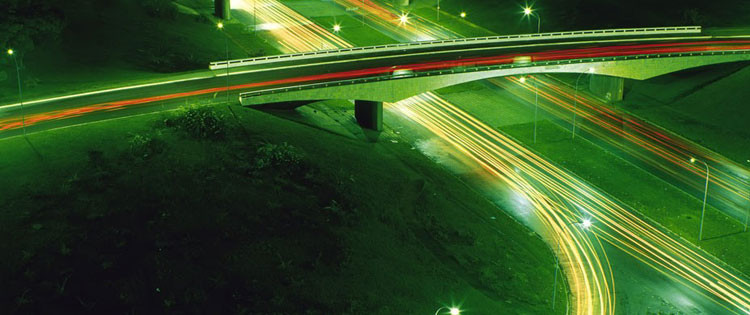
(April 18, 2018 – Austin, Texas) The Texas Conservative Grassroots Coalition’s latest project – strong opposition to parts of the Trump infrastructure plan, which calls for toll roads and corporate welfare public/private partnerships – is being led by Texans Uniting for Reform and Freedom (TURF), Texans for Toll-free Highways, and Grassroots America – We the People PAC. The Coalition’s opposition was voiced in a letter to President Donald J. Trump and expresses widespread displeasure among Texas conservative grassroots leaders with Trump’s infrastructure plan.
“While some have called the Trump proposal DOA on Capitol Hill, we take nothing for granted and made the trip to D.C. to deliver it to the White House personally to ensure the President got the message from a BIG, red state with 38 electoral votes – we don’t want tolls!” declares Terri Hall, Founder/Director of Texans for Toll-free Highways and Texas TURF.
JoAnn Fleming, Executive Director for Grassroots America – We the People PAC stated, “We are much more confident that Texas – under the leadership of Gov. Greg Abbott and Lt. Gov. Dan Patrick – will make much sounder transportation decisions than the far-flung bureaucracy in Washington, which makes no actual progress in stopping wasteful practices or balancing the federal budget! This is why we support a federal block grant of our federal highway funds back to Texas with a bare minimum of federal strings.”
TURF hand-delivered copies to all U.S. House Members serving on the Highways and Transit Subcommittee, as well as all U.S. Senators serving on the Senate Environment and Public Works Committee (the committee that handles surface transportation legislation). In all, TURF visited more than 75 offices in D.C. last week, many of which were sit-down meetings with Congressional Members and the President’s senior staff.
The Coalition also delivered the letter to Gov. Greg Abbott, urging the Governor to stand strong against tolls as he promised to fix Texas roads without new toll taxes, (which he reiterated last fall as he directed the Texas Department of Transportation (TxDOT) to rework 15 toll projects to be completed without tolls). Last week, the Regional Transportation Council (RTC) proposed to defy the Governor, Lt. Governor Dan Patrick, and other state elected officials, such as Sen. Bob Hall and Sen. Don Huffines, who represent the area. The RTC plan advocates adding two toll managed lanes as part of the expansion of I-635 E from US 75 to I-30. Rumblings from the Governor’s office appear to suggest he’ll go along.
Abbott’s Texas Transportation Commission Chairman Bruce Bugg made his intentions crystal clear in a letter to the RTC in March that he expected a non-toll solution or no deal. Angered by the apparent about-face, grassroots leaders have drawn a line in the sand and refuse to budge.
“Managed lanes are toll lanes. Tolls are taxes. This project is not toll viable per TxDOT’s own study and requires taxpayer subsidies. Everyone will pay for it, but only the few who can pay tolls (like the $1/mile on MoPac in Austin), will ever be able to afford to drive on them,” Terri Hall of TURF explains.
In 2015, the legislature passed House Bill 20, requiring TxDOT to put explicit policies in place to ensure the highest priority projects got funded first. Yet, that’s not what happened. The majority of the new funds were allocated to low priority projects, by design, so that TxDOT could claim there’s not enough money to fix the big urban projects. This incentivizes local governments to tap a toll revenue stream for the most congested roads, which creates unaccountable slush funds outside the reach of taxpayers.
Grassroots America’s Fleming says, “This is just another problem of TxDOT’s own making. The voters gave them $5 billion more per year in new funding (with passage of Prop 1 & 7), and they squandered it on low priority projects so they could cry poverty in urban areas and slap tolls on commuters already choking under the burden of toll taxes. Special corporate interests, promoted by anti-taxpayer local government shills, benefit most from these unfettered tolling and multi-leveraging schemes.”
Fleming added, “Working families across Texas have made it abundantly clear that they do not want more toll roads. In fact, 90% of Republican Primary voters approved of a March 6 ballot resolution that stated, ‘No governmental entity should ever construct or fund construction of toll roads without voter approval.’ This means the Republican base has Gov. Abbott’s back on his strong opposition to more toll roads and more debt. His base wants him to keep his campaign promises.”
The RTC’s actions indicate if local governments lobby the Governor and his Transportation Commission for toll ‘managed’ lanes, that they’ll consider giving toll projects a green light despite campaign promises.
“It’ll be used as a model by every other local board, and we’ll end up with tolls everywhere after the Governor promised no more,” Terri Hall predicts.
The Coalition applauds Abbott’s challenge to local governments on an array of anti-liberty and anti-taxpayer local ordinances, and they expect him to continue to keep his promises for the highway system directly under the jurisdiction of the State of Texas.
###
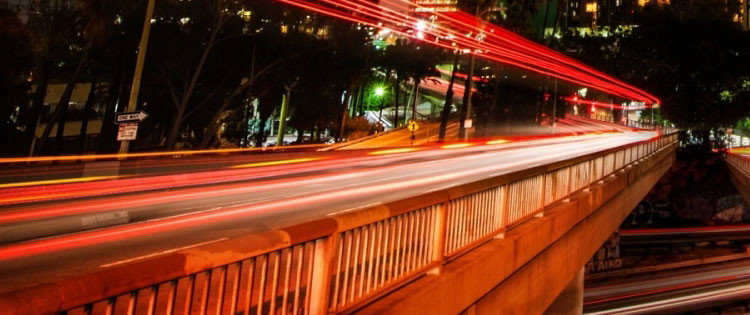
IMMEDIATE RELEASE
(Austin, Texas, Wednesday, March 7) It was a good night for anti-toll candidates yesterday as voters headed to the polls for the March 6 primary election. Gov. Greg Abbott led the way winning overwhelmingly with 90% of the vote, United States Senator Ted Cruz right behind him with an impressive 85%, and Lt. Governor Dan Patrick, also winning handily with 76%. Though no one expected the primary challengers to pose a real threat to the state’s three top officials, some others down ballot had real threats and they survived — some convincingly.
With Senator Bob Hall being the most high profile target of the pro-toll cabal, he won the primary with 53% of the vote. Anti-toll State Representative Pat Fallon beat pro-toll incumbent Senator Craig Estes in Senate District 30, garnering 62% of the vote. In Senate District 8, anti-toll Angela Paxton won the open seat replacing anti-toll Sen. Van Taylor (who also overwhelmingly won the primary for congress in District 3). In a highly contested race for congress to replace retiring U.S. Rep. Lamar Smith in District 21, two anti-toll candidates head to a run-off. Texans for Toll-free Highways endorsed Chip Roy, who led the crowded field of 18 candidates with 27% of the vote.
Perhaps the biggest upset of the night for the anti-toll cause was in House District 114 where Lisa Luby Ryan ousted the rabidly pro-toll incumbent Jason Villalba, who has persistently pushed tolls on I-635E. Anti-toll Mayes Middleton unseated pro-toll incumbent Wayne Faircloth in House District 23, with opposition from Abbott aiding in putting Middleton over the top. In House District 106, anti-toll Jared Patterson won the open seat vacated by Fallon.
Other notable anti-toll races were in House District 73, where current State Representative Kyle Biedermann had a fierce challenge from pro-toll Dave Campbell, but Biedermann won with 58% of the vote in a race where over 30,000 ballots were cast (which dwarfs most house races). Other challengers to House Freedom Caucus members, Mike Lang, Matt Schaefer, and Valoree Swanson were also defeated. The Freedom Caucus stands strong against toll roads, and they’re credited with helping the grassroots get 6 out of 7 anti-toll reforms into law last year.
Another intense anti-toll race is brewing in House District 13, where the battle for this open seat takes center stage with anti-toll Jill Wolfskill leading as she heads into a run-off with pro-toll former County Judge Ben Leman in a race where tolls on SH 249 have rocked Grimes County with controversy for several years. In House District 8, anti-toll Thomas McNutt made it into a run-off along with Matt Beebe in House District 121 in another fierce battle for the open seat vacated by embattled Speaker Joe Straus.
Anti-toll Stuart Spitzer heads to a run-off in House District 4, along with Brent Lawson in House District 62. In House District 107, anti-toll DeAnna Metzger almost won outright in a three way race (she captured 45% of the vote), but she’s headed for a run-off before facing the ardently pro-toll incumbent Victoria Neave in the general election this fall. Anti-toll Jonathan Boos won in a three-way race for the open seat in House District 113 vacated by current State Rep. Cindy Burkett. Michael Berlanga also won the GOP primary for House District 117. Berlanga faces the tough challenge of unseating pro-toll Philip Cortez in the general election.
Meanwhile, three friendly anti-toll incumbent state representatives, Giovanni Capriglione, Rodney Anderson and Ron Simmons retained their seats. Anti-toll former State Rep. Steve Toth won his primary in the bid to regain his old seat.
Even in some local races, anti-toll challengers fared well. Anti-toll Mark Keough beat the pro-toll incumbent in the Montgomery County Judge race, and anti-toll Gregory Parker managed to get the incumbent in the Montgomery County Commissioner Precinct 2 into a run-off.
Also appearing on the GOP ballot was Proposition 2 a big litmus test for the anti-toll sentiment in the party. It stated: “No governmental entity should ever construct or fund construction of toll roads without voter approval.” It passed with 90% of the primary voters, signaling the GOP base is sick of paying toll taxes, especially without their consent.
All told, anti-toll candidates had a fantastic showing with 18 wins and 7 making it into run-offs, sending a message not only to state leaders but all the way to Washington D.C. where the recently released Trump infrastructure proposal is pushing tolls, particularly those that hand public highways to private toll operators in 50-year sweetheart deals. Texans have said ‘No’ to tolls from the beginning and their voices are only getting louder.
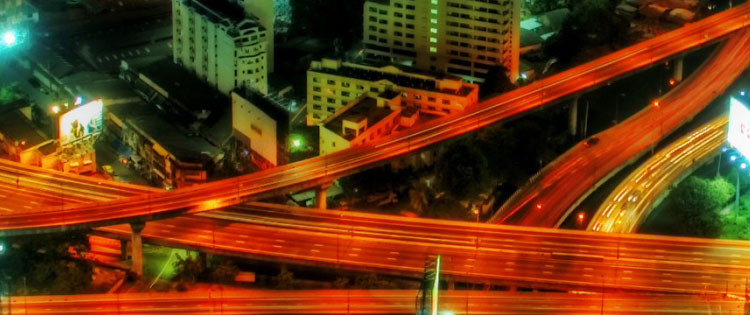
Former U.S. Senator Kay Bailey Hutchison (R-TX) was instrumental in protecting taxpayers from double taxation by defending the ban on tolling existing interstates during her tenure, even imposing a special provision to protect Texas. Now Trump wants to provide states “flexibility to toll existing interstates.” This means the lanes you drive today toll-free could now have tolls slapped on them simply to generate revenue for big government as a new tax in the hands of unelected toll agencies or to line the pockets of private toll operators — completely out of reach of the voters.
Trump’s base sees the president as a champion of the working man. They elected him to look out for American workers by cracking down on illegal immigration, nixing or renegotiating hostile trade agreements, and putting more money back in their pockets. Now they may be asking, what good does it do to put money back in one pocket through tax cuts only to take it out of the other with confiscatory toll taxes, especially in the hands of private, for-profit, global corporations?
Groups like Alliance for Toll-free Interstates along with many grassroots groups that span the country from tea parties to pro-taxpayer organizations vehemently oppose the toll component of Trump’s plan. P3s are particularly unpopular due to the massive taxpayer subsidies and putting taxpayers on the hook for most of the funding through federal loans and bonds.
“Tolls are a wildly inefficient tax, sacrificing money that could go toward construction to corporate profits and administrative costs. In addition to the diversion onto secondary roads which causes congestion and public safety issues, tolls will do unimaginable harm to businesses, as shipping and manufacturing prices skyrocket to account for these new costs,” said Stephanie Kane, spokesperson for the Alliance for Toll-Free Interstates. “This plan is not innovative or good policy – it is simply a nationwide plan for #TrumpTolls.”
“The Trump Administration’s infrastructure plan is choosing Wall Street over Main Street. Tolls will take money from hardworking Americans and give huge profits to toll road investors – many of which are foreign companies,” Kane said.
It’s not just commuters who worry about this new tax. Industries such as shipping and manufacturing fear the added cost tolls will add to moving goods throughout the country, increasing costs to consumers.
“Everyone understands the inefficiencies of toll collection and that a large portion goes to investors instead of road construction, but what they may not be aware of is the impact on the cost of doing business. Companies that move goods, such as UPS, rely upon the unrestricted flow of goods on interstates to move freight throughout the country. Nationwide tolls will dramatically impact the cost of moving goods, and ultimately consumers will pay a higher price,” said Rich McArdle, President of UPS Freight.
When the interstate highways system was conceived, the president and congress decided to do it with a gas tax based system rather than tolls because there would never be enough money collected in rural parts of the country to pay for their own roads. So the renewed push for tolls is looking an awful lot like a targeted tax on urban commuters — the very working class voters that comprise Trump’s base.
The federal-aid highway system has been primarily funded with a federal gasoline tax, currently at 18.4 cents per gallon which has remained unchanged since 1993. With revenue from gas tax chronically falling short of what congress spends, politicians love turning to tolls as a get-out-of-jail-free card to voting for a tax hike. But most Americans aren’t fooled by the distinction without a difference – a toll is a tax, especially when being imposed on lanes their tax money has already build and paid for.
Tolls have been and will remain wildly unpopular with ordinary citizens. The crony capitalist wing of the Republican party seems to be winning over the president in lieu of his Main Street voter base. The opposition to tolls, especially those imposed on lanes that are already paid for, will only grow stronger and louder as congress weighs the president’s proposal.
Unexpected delay by Commission puts non-toll fix to LBJ E in Dallas on hold
By JoAnn Fleming and Terri Hall
A showdown was expected at today’s Texas Transportation Commission meeting over Interstate-635 E as elected officials seeking to make good on their campaign promises to end tolls were butting heads with transportation interests seeking to lobby for more tolls. Thanks to the tireless work of Senator Bob Hall who had brought the various factions together, all the players from across the spectrum had agreed to advance a non-toll expansion of Interstate-635 E (from US-75 to Interstate 30) without tolls, sidelining tolled express lanes in accordance with the policy of Governor Greg Abbott and Lt. Governor Dan Patrick, who recently pulled the plug on future toll roads in response to grassroots pressure. The non-toll plan is what appeared on today’s agenda.
However, to everyone’s surprise, Chairman Bruce Bugg announced that he would delay action on the project. He referred to a $1 billion funding gap between the old toll plan and the newly brokered non-toll version, but Transportation Director of the Regional Transportation Council Michael Morris very articulately begged to differ.
Morris laid out several scenarios of how the non-toll freeway expansion was fully funded and how it could move forward today without further delay. Even the Texas Department of Transportation (TxDOT) Deputy Executive Director Marc Williams testified the non-toll project was, in fact, ‘fiscally constrained,’ which means fully funded.
Morris believes there are at least five areas where the project costs should be reduced under the new plan, and both he and Hall strongly encouraged the commission to take action in today’s meeting and not delay this project another day.
This and 14 other toll projects were put on hold after Abbott and Patrick issued strong statements in November directing the highway commission to pull toll roads from the state’s plan and go back to the drawing board to get them done non-toll with existing taxes.
Hall, Morris, and the area’s Transportation Commissioner Victor Vandergriff were all blind-sided by the commission’s delay. Approval of the deal at today’s meeting would have been a win-win for all parties, especially Texas commuters and taxpayers. However, now it’s unclear as to how quickly the commission will act, whether it will be at its next meeting in February or indefinitely. Morris said any delay costs the taxpayers $5 million a month.
Hall stands with Abbott who promised to fix Texas roads without more taxes, fees, debt, or tolls.
“For an executive who can afford to take the toll lanes, he gets to race home and make himself a martini, but for the poor working guy, he has to decide whether to get home faster or whether he can buy the baby some milk,” Hall articulated.
“Tolls are a cruel form of taxation without representation. They’re punitive,” Hall noted.
He’s pointed out recently that toll taxes create a long-term penalty for the working class. At today’s average cost of $5.00 each direction, it will cost the family of a worker – over the course of their lifetimes – in excess of $135,000 for the ‘privilege’ of using the toll lane!.
“That’s like taking a home or a couple of college educations away from that family, while they face a daily fee that could well be the equivalent of a $25.00 per-gallon gasoline tax. This is an outrageously unacceptable tax burden,” Hall argues.
Tolls were once pushed as necessary to get projects funded, but with the advent of Prop 1 and Prop 7 as sources of new non-toll funding, officials have a way to get projects moving without the additional toll tax. Now the argument has become, tolls are necessary as a way to ‘manage’ traffic. It’s an attempt by government bureaucracies to ‘manage’ congestion through variable pricing, also known as congestion tolling. The more cars that use the managed lanes, the higher the toll in order to knock cars out of the lanes to maintain a certain speed in the toll lane. Meanwhile, the adjacent ‘free’ lanes remain congested for the foreseeable future.
Managed lanes signal the end of freeway expansion. When frustrated commuters demand more capacity, the bureaucrats’ answer will be carpool, get on a bus, pay the toll, or stay stuck in traffic. Some local politicians have bought into the thinking that the only way to address congestion is through tolls, which the majority of Texas voters reject (take a look at the Texas GOP platform).
When tolls under a managed lane scenario are already exceeding $1/mile on MoPac in Austin and over $4/mile to get into Washington D.C. today on I-66, this unsustainable, untenable situation must come to an end. Thanks to taxpayer heroes like Senator Bob Hall, congestion weary commuters on I-635 E have help on the way and the conservative grassroots has his back.
IMMEDIATE RELEASE

(Richmond, VA, January 22, 2018) Following the leak of the draft Trump White House infrastructure plan, the Alliance for Toll-Free Interstates issued the following statement, which can be attributed to spokesperson Stephanie Kane:
“The leaked Trump infrastructure plan is a complete reversal of President Trump’s commitment to putting America First. Although then-candidate Trump campaigned against lining the pockets of Wall Street and promised to be the voice for the working class, this plan does the opposite. President Trump is choosing Wall Street over Main Street. It would take money from hardworking Americans and give huge profits to toll road investors – many of which are foreign companies.
“The leaked document allows ‘states flexibility to toll on interstates’ and reconciles ‘the grandfathered restrictions on use of highway toll revenues with current law.’ That translates to a complete reversal of the current federal ban on tolling existing interstates. Tolls are simply a new tax. They are wildly inefficient, sacrificing money that could go toward construction instead going to corporate profits and administrative costs. In addition to the diversion onto secondary roads which causes congestion and public safety issues, tolls will do unimaginable harm to businesses, as shipping and manufacturing prices skyrocket to account for these new costs.
“The current Trump plan could result in a patchwork of tolls that span coast to coast. This plan is not innovative or good policy – it is simply a nationwide plan for #TrumpTolls. There is a real opportunity for a long-term solution to our transportation infrastructure needs, but it shouldn’t include tolling our interstates.”
To learn more about ATFI and join the Alliance, please visit TollFreeInterstates.com. Connect with the Alliance on Twitter at @No2Tolls and Facebook at facebook.com/TollFreeInterstates

Abbott, Patrick tame rogue highway department, scrap new toll projects
It’s not very often that the lowly taxpayer gets a win this big, but it finally came. After 12 years of wrangling over toll roads, Governor Greg Abbott and Lt. Governor Dan Patrick came to the rescue issuing a final decree ending toll roads in Texas.
The Texas Department of Transportation (TxDOT) ignited a taxpayer revolt when it proposed 15 new toll projects as part of the update to its ten year plan — the Unified Transportation Plan (UTP). Not only did TxDOT try to railroad a litany of toll projects, it adopted a plan to use Prop 1 and Prop 7 funds that are constitutionally protected from going to toll projects to finance the US 183 toll project in Austin.
Abbott campaigned on the promise of fixing Texas roads without raising taxes, fees, debt or tolls. He reiterated his position in his first State of the State address in 2015 as well as when he announced his Texas Clear Lanes initiative that was to focus funding on the state’s most congested roads.
The Texas Conservative Grassroots Coalition led by Texans for Toll-free Highways and Grassroots America – We the People fired off a letter to Abbott’s newly named Texas Transportation Chair Bruce Bugg, along with a press release that didn’t mince words, “Read Our Lips: No New Toll Taxes.”
Patrick weighed-in first with a strong public statement, “I oppose adding any additional toll lanes to TxDOT’s UTP. I fought against increasing the state’s reliance on toll roads as a state senator and I have continued that fight as lieutenant governor. The Texas Legislature worked hard to pass Proposition 7 in 2015 to provide billions in funding for transportation infrastructure to help eliminate the state’s need for additional toll roads. Eliminating the need for tolls was one of the primary reasons the Texas Legislature passed Prop 7 and why Texas voters approved it. No new toll roads have been approved by the Senate or the House in the last two sessions and legislators I have spoken with are very unhappy that the Commission seems now to be going in a direction that opposes the will of the legislature and the majority of Texans.”
Patrick also said he sent a letter to Bugg asking him “to develop a plan that contains no additional toll lanes.”
Then Abbott made clear that he expects the same. Spokeswoman Ciara Matthews stated: “The governor and his staff have been in constant communication with members of the Texas Transportation Commission and TxDOT staff to express their desire to not include new toll roads as part of TxDOT’s Unified Transportation Plan.”
Within hours, TxDOT issued its own statement retreating from its position just hours earlier at its Transportation Commission hearing, “Members of the Texas Transportation Commission and TxDOT staff have been in regular contact with the Governor’s office over the past several weeks and we understand the Governor’s expressed desire to not include new toll roads. In response to public comments received, we are developing a plan to scrub the UTP update of any toll roads in the proposed revisions.”
Boom!
So ten days after the grassroots issued its letter in support of Abbott’s no-toll promise and asking for intervention, he and Patrick wasted no time in squelching the rogue agency. Last week, Rep. Joe Pickett requested an attorney general opinion on whether or not TxDOT’s use of Prop 1 and Prop 7 funds on a toll project was even legal, which prompted news reports outing the agency’s deliberate attempt to violate the constitutional protection voters overwhelmingly chose to put in place.
The confluence of events created a perfect storm that led to a public showdown between the taxpayers and a rogue highway department bent on ramming toll roads down voters throats, despite the persistent movement away from toll roads by their elected representatives in recent years.
The unpopularity of toll roads has been reaching a boiling point in Texas. As the house of cards was falling on toll roads, the Texas Tribune ran a story highlighting the reality many commuters now face — pay hundreds of dollars a month in punitive toll taxes to get anywhere, or sit in traffic and watch your quality of life disappear.
One Austin resident literally decided to sell her house and downsize into an apartment to relieve herself of the aggravation of unrelenting traffic in the non-toll lanes or paying ridiculous sums of money in tolls to get to work in a reasonable timeframe.
Her story is echoed by many Texans, especially in the toll saturated Dallas-Ft. Worth Metroplex where drivers can scarcely go anywhere without facing unbearable gridlock or paying tolls upwards of $10/day.
Sen. Bob Hall issued a scathing statement on TxDOT’s proposed toll plan that equates the typical $10/day toll to a $25 per gallon gasoline tax that, over a lifetime, would mushroom into an eye-popping $135,000 in toll taxes.
“This is an outrageously unacceptable tax burden, and Governor Abbott must step-in to stop it before it’s too late.”
Well, Texas taxpayers can breathe a sigh of relief this Thanksgiving that both Abbott and Patrick did just that and rescued commuters from further oppressive toll taxes on 15 more Texas highways. It’s rare for a promise made to be a promise kept in politics. These two leaders are to be commended for keeping their promises to Texas voters.
Burkett wants highest possible toll taxes for constituents
With Cindy Burkett throwing her hat in the ring in an attempt to unseat grassroots conservative stalwart Senator Bob Hall, the voters of Texas Senate District 2 need to know about her record. Burkett was quick to support selling off Interstate 635 E to the highest bidder using a controversial toll contract known in Texas as a comprehensive development agreement (or CDA) that gives control of our public roads to private toll companies.
Interstate 635 toll lanes from I-35E to the Dallas North Tollway are already operated by Spain-based Cintra. Commuters in the Metroplex face paying upwards of $24/day in tolls to this foreign corporation just to get to work, and no elected official has any control over how high those toll rates can go. Burkett wants that tax burden to extend to commuters in her own district from US 75 to I-30.
Such contracts give private corporations the exclusive right to extract the highest possible toll from the traveling public in a 50-year monopoly. The private entity receives millions in gas taxes to subsidize their ‘private’ project along with federal loans and bonds backed by taxpayers. CDAs contain non-compete agreements that penalize taxpayers for the expansion of free routes, manipulate speed limits on free routes, and use the power of the state for toll collection and to block your vehicle registration or impound your car if you don’t pay up.
During the public hearing earlier this year on the bill, HB 2861, that would have handed I-635 E to a private toll operator, House colleague and former Transportation Committee Chair Rep. Joe Pickett insisted toll managed lanes do not solve congestion problems because so few can afford to utilize them. Another colleague, Rep. Ron Simmons, maintained tolls, particularly CDAs, are a targeted tax on certain areas while other Texans get their roads fixed without the additional tax burden of tolls. Simmons even asked how can pushing the most controversial and expensive form of tolling be reconciled with Governor Greg Abbott’s promise to fix our roads without new tolls or debt?
But rather than express similar sentiments or concerns about the oppressive tax burden of $200-$400/month in tolls such a deal would impose on her constituents, Burkett sat silent or left the room altogether. Burkett voted in favor of it in committee and again on the House floor, but the bill was ultimately defeated by a vote of 85-51.
In the prior session, Burkett not only supported HB 3556 — the first attempt to toll I-635 E that also failed to pass — she authored it. Though it started as bill restricting the use of tolls, she changed the language giving the Texas Department of Transportation (TxDOT) a free pass to impose tolls if they determined there wasn’t enough traditional funding to do the project. Burkett knew full well that the excuse for why the project hasn’t commenced is because TxDOT claims there isn’t enough funding unless it’s tolled. Burkett even acknowledged that her constituents have made it clear that they don’t want tolls, but she insisted it remain an option until the state boosted road funding.
Well, Texas voters did just that when they voted to give TxDOT $5 billion more per year in new road funding when they overwhelmingly passed both Prop 1 in 2014 and Prop 7 in 2015. Yet Burkett apparently thinks that’s still not enough and came in the very next session pushing the bill to not only toll but also to privatize I-635 E anyway.
TxDOT has since conducted a toll feasibility study for I-635 E and Burkett now knows that TxDOT’s study shows the project isn’t toll viable. So why would she twice vote to support a CDA bill this year to allow a private toll corporation to slap tolls on it for a half century, especially since public subsidies would be needed to build it, setting up a double tax scenario?
While Burkett has filed bills to increase transparency on toll studies and at the North Texas Tollway Authority, her penchant for tolling I-635 E, selling it off to a private entity in a sweetheart deal backed by taxpayers (clearly the most expensive option), and advocating for the double taxation of her constituents, outweighs that legislation.
This is no time for lukewarm or playing footsie with special interests like Cintra who clearly wants to get its hands on the rest of I-635 E to extend its toll road all the way to I-30. The ever increasing tax burden is choking Texas residents on every front. Between the House’s failure to enact property tax reform and Burkett’s push to privatize and toll a major interstate residents rely on for daily living, the best choice in the race for Senate District 2 is the current Senator Bob Hall.
In contrast to Burkett, Hall has fought new toll taxes on every front. He’s filed and passed bills to prevent both free lanes and HOV lanes from being converted into toll lanes (as is the plan on I-635 E), as well as filing Senate Bill 84 to fight for a way to fund I-635 E without tolls by tapping some of the new sales tax revenue that would emerge from commercial development once the frontage roads are built.
Hall has also filed bills to abolish wasteful toll authorities as well as subject them to sunset review, co-authored the bill to block state funds from subsidizing toll projects (to prevent double taxation), and force disclosure of toll viability studies. He currently serves as the Vice Chair of the Senate Transportation Committee and has earned the trust and respect of his colleagues. He’s earned an A+ from anti-toll groups both sessions he’s served as a senator. Together with his pro-taxpayer record on every other issue aside from transportation, Bob Hall is a fierce, faithful taxpayer champion in the Texas Senate and the right choice to serve Senate District 2.
(November 8, 2017 — Austin, Texas) Today, a Texas Conservative Grassroots Coalition project led by Texans Uniting for Reform and Freedom (TURF), Texans for Toll-free Highways, and Grassroots America was hand-delivered to Gov. Greg Abbott and his new Transportation Commission Chair, Bruce Bugg. The Coalition letter insists that the Transportation Commission, TxDOT, and all related mobility authorities make good on Governor Abbott’s promise to build needed roads without new toll taxes. The Coalition project was launched in response to last week’s proposal by TxDOT to the Transportation Commission to approve over a dozen new toll projects in the state’s ten-year plan. Fifteen of the 17 projects are toll projects, including I-35 in Austin and San Antonio, I-635E in Dallas, I-45 in Houston, and Loop 1604 on San Antonio.
JoAnn Fleming, Grassroots America’s Executive Director said of the latest proposal for new toll projects, “Apparently, the state and local transportation bureaucracies didn’t get Gov. Abbott’s memo during his first campaign for Governor and haven’t listened ever since. The Governor has repeatedly underscored his vow to get Texas off the toll road and debt scheme. He’s made it clear he wants the state on a pay-as-you-go plan for road construction, and voters have approved the funding.
“So, it’s about time TxDOT, the Transportation Commission, the RMAs and the MPOs all got on the same page with Governor Abbott. We are sick and tired of this nonsense. There’s always another bureaucratic plot afoot with perpetual whining that they don’t have enough money. If they spent one-quarter of their time working to eliminate bone-headed, wasteful processes that burn through cash, instead of devising ways to defy the Governor and the state constitution, we’d all be better off.
“This goes back to the Sunset Advisory Board’s Report to the 85th Legislature, which stated, ‘As currently structured, TxDOT’s project development process is not meeting expectations and is not prepared to effectively handle the influx of new transportation funding projected to double over the next decade. TxDOT has not met key on-time or on-budget measures for several years…’. It’s time for these bureaucracies to stop undermining our Governor and do their jobs. Gov. Abbott needs to put his foot down to stop these rogue actions, which undermine his administration.”
Terri Hall, Founder and Director of TURF and Texans for Toll-free Highways, notes, “Working families across this state have made it abundantly clear that they do not want more toll roads. Taxpayers approved two constitutional measures giving the biggest boost in highway funding to TxDOT in a generation, and they are rewarded with more toll roads? Talk about disrespect! Texans elected this governor on the promise that he was parting ways with the Rick Perry toll road cram down. Gov. Abbott even ran television campaign ads promising to fix our roads without tolls. Now his highway Commission is on the verge of approving 15 more toll projects? It’s decision time, and he’s running for re-election. How this comes down will not go unnoticed by the grassroots.”
Senator Bob Hall, Vice Chair of the state Senate Transportation Committee, strenuously objecting to more toll roads, explained, “Toll taxes create a long-term penalty for the working class. At today’s average cost of $5.00 each direction, it will cost the family of a worker – over the course of their lifetimes – in excess of $135,000 for the ‘privilege’ of using the toll lane! That’s like taking a home or a couple of college educations away from that family, while they face a daily fee that could well be the equivalent of a $25.00 per-gallon gasoline tax. This is an outrageously unacceptable tax burden, and Governor Abbott must step-in to stop it before it’s too late.”
Chairman Bugg’s comments indicate that if local governments lobby the Commission for toll ‘managed’ lanes, that they’ll consider giving toll projects a green light, despite the Governor’s campaign promises, “When a local community comes to this Commission and states that they want to add capacity, and they know the funds are not available, they want to support a managed lanes concept; and when the funds that Governor Abbott and the Texas Legislature worked so hard to provide are not being used, then I think this Commission needs to consider the local community’s support for a managed lane project.”
Coalition partners want Gov. Abbott to challenge local governments on their abusive use of excessive tolling just as he did on an array of anti-liberty, anti-taxpayer local ordinances during the past legislative and special sessions.
Taxpayers also want Governor Abbott to investigate why the public is being told there’s not enough funding for the most congested roads after they only recently voted to approve nearly $5 billion in new annual funding with approval of Prop 1 and Prop 7. In 2015, the legislature passed House Bill 20, requiring TxDOT to put specific policies in place to ensure the highest priority projects are funded first. Yet, that’s not what has happened. The majority of new funds have been allocated to low priority projects – by design – so that TxDOT could cry poverty and enable local governments to tap a toll revenue stream for the most congested roads, creating unaccountable slush funds outside the reach of taxpayers.
Constitutional crisis?
Texas Conservative Grassroots Coalition leaders say the Transportation Commission is in violation of the law because the Commission is using Prop 1 and Prop 7 funds – money that is constitutionally barred from use on toll projects – to subsidize the US 183 toll project in Austin.
TxDOT’s presentation to the Commission on October 26 clearly shows $120 million in Prop 1 and Prop 7 funds are to be used on the US 183 toll project. In a clever deception, the agency claims it can make the move appear legal by separating the financing of the toll lanes from the non-toll lanes; however it’s all part of the same project! In the same presentation, TxDOT states that it will be doing the US 183 toll project under one contract procurement, not as two separate projects.
TxDOT’s prior policy, as evidenced in a 2014 letter to State Rep. Ron Simmons by then-Deputy Executive Director of TxDOT John Barton, clearly states if any part of a project has a toll element, it would not be eligible for Prop 1 funds. Prop 7 has the same constitutional restriction as Prop 1 and cannot be used on toll projects either.
“Apparently, TxDOT has decided they are not required to follow the Texas Constitution. Their brazen actions at the Commission last week are a movement toward lawlessness. If a state agency can simply break up a toll project into two parts in order to subvert the constitutional restrictions voters deliberately put in place on Prop 1 and Prop 7 funds, then it will continue to do so on every toll project. This scheme, if not challenged, will set a dangerous precedent, and we’re not going to stand for it,” concludes Terri Hall.
Tolls top $8 for commute on newly opened MoPac toll lanes
It didn’t take long for toll rates to exceed affordability. The newly opened toll managed lanes on MoPac (from Lady Bird Lake to Parmer Lane) in Austin topped $8 to go 11 miles, and cost $6.28 to drive the northern 6 miles during the evening commute. That’s just in the first week of operation. If you think that’s insane, that’s because it is. No one should have to pay over $1 a mile to get to or from work in a reasonable time. Texans pay a litany of road taxes, primarily the gasoline tax, to pay for public highways. Twice in as many years, Texas voters gave the largest boost in road funding to the state highway fund — totaling nearly $5 billion more per year. Yet supercharged toll roads continue to come online virtually unabated.
Toll managed lanes like those on MoPac use congestion pricing. The toll you pay no longer relates to the actual cost of building the road you’re driving on. Now tolls vary based on the level of congestion, rising and falling continually throughout peak hours, potentially changing in 5-minute intervals. Toll roads often provide time reliability, but today’s congestion tolling means you don’t have price reliability. A study done in 2016 by the Texas Transportation Institute at A&M, found that congestion tolling both angers and confuses the public. It states one of the biggest challenges is public acceptance.
According to the study, the top three reasons the public dislikes congestion tolling are: opposition to paying more to travel on top of what the public is already paying for roads, the complex requirements for using the lanes that change based on region, time of day, number of people in the car, and price, and the tax burden on lower income drivers without good non-toll options.
To add to the outrage, the MoPac toll project was fully paid for by the Texas Department of Transportation (TxDOT) with $200 million in gasoline taxes. No debt was owed to build it. When the public balked at the double tax scheme of making drivers pay a toll to use a road their taxes paid for, officials turned it into a loan to be paid to the local transportation policy board who will use it to build other roads MoPac drivers may never use.
Taxpayers also ended up paying $38 million more for the project than estimated, and it was over two years behind schedule in opening, with the prolonged construction negatively impacting businesses and commuters alike. Because of the legal troubles of dealing with the design-build contractor, CH2M, the Central Texas Regional Mobility Authority (CTRMA) will issue debt to pay-off the contractor to make potential litigation disputing various change orders and additional work go away.
Even with the $38 million in additional costs and the agency having to issue some debt to finish paying the contractor, the $20 million in debt issued is a drop in the bucket and no excuse to charge Austinites tolls in perpetuity to use lanes their taxes already paid for. The debt is due to the project’s gross mismanagement by a rookie agency, the CTRMA, that lacks the accountability and depth of project management experience of TxDOT (that our taxes already pay to operate). So Texans are paying taxes upon taxes to build and maintain public highways thanks to this duplicative, wasteful, mismanaged bureaucracy running the show.
Given that the CTRMA’s Executive Director who oversees a dozen employees makes $366,112 a year compared to the $299,812 salary of TxDOT’s Executive Director, who oversees 11,000 employees, you get a glimpse at the Texas-sized toll bureaucracy problem. State lawmakers have long excused digging into the financial waste and mismanagement at TxDOT because the state lacks the funds and resources to audit an agency that big. How will adding nine more of these mini-TxDOT’s known as Regional Mobility Authorities solve the problem? It exploded the waste ninefold.
Taxpayers will continue to face a logjam of ill-conceived toll projects just like MoPac all over the state despite Governor Greg Abbott’s campaign promise to fix Texas without more taxes, fees, tolls, or debt. Why? As long as local transportation boards known as Metropolitan Planning Organizations (MPOs) continue to push for toll slush funds to fund a host of local pet projects, the governor’s highway commission has shown little appetite for bucking them. Voters need to get engaged or risk being priced off their public roadways altogether. If congestion tolls are starting out at over $1/mile in peak hours, imagine what they’ll be next year or in 10 years. There is no legal requirement to remove tolls from these highways, even when there’s no debt owed. Expect Texas commuters to do a full court press to change that when the legislature reconvenes in 2019.
